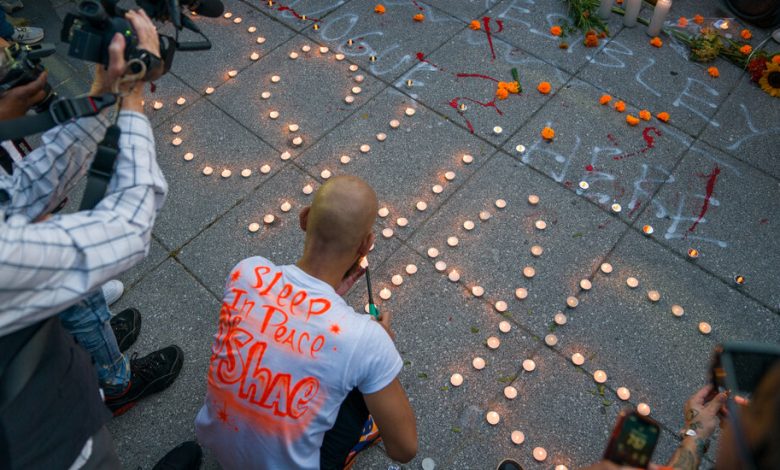Twist in Dancer’s Killing as Key Detail About Suspect Is Challenged

In the days after O’Shae Sibley, a Black gay man, was killed during an altercation outside a gas station in the Midwood neighborhood of Brooklyn, the picture that emerged suggested an explosive combination of homophobia, religious intolerance and racism.
A witness said a group of men that included the teenager charged in the killing used homophobic slurs and told Mr. Sibley that they were Muslim, and he should stop dancing. Some initial media reports picked up that account. Mayor Eric Adams and the police held a news conference at which the mayor stressed that the killing was not evidence of Muslim hatred of gay people.
Now, it appears the man charged with Mr. Sibley’s murder is not Muslim at all. The suspect, Dmitry Popov, 17, is Christian, his lawyer said, altering at least one aspect of a killing that has drawn national attention.
Mr. Sibley’s death had raised concerns about how the charged accusations could hurt relations between two marginalized communities, gay people and Muslims. In fact, the two groups stood together.
At the news conference on Saturday, Mr. Adams, joined by leaders from the city’s gay and Muslim communities, said that both L.G.B.T.Q. people and Muslims have been victims of hate, he said, and the two communities “stand united against fighting any form of hate in this city.”
Mr. Sibley, a dancer and choreographer, was returning from New Jersey to his home in Brooklyn on the evening of Saturday, July 29, when he and his four friends stopped at the gas station, the police said. As the men filled up their car, they played music by Beyoncé and danced, and a group of men approached and told them to stop.
The men yelled homophobic slurs and anti-Black statements at Mr. Sibley and his friends, according to Joseph Kenny, an assistant chief at the Police Department’s detective bureau, at a news conference on Saturday.
Summy Ullah, a 32-year-old gas station attendant who witnessed the encounter, said one of the young men said, “I’m Muslim. I don’t want this here.”
Within minutes, the heated verbal altercation had turned violent, according to the police. Mr. Sibley was stabbed once in the chest, Mr. Kenny said. He was taken to Maimonides Medical Center, where he was pronounced dead.
Mr. Popov, 17, a high school student from Brooklyn, turned himself in last Friday and was charged with second-degree murder, second-degree murder as a hate crime and criminal possession of a weapon. He was denied bail in State Supreme Court in Brooklyn on Monday and is being held in detention.
Court documents said that a witness heard the group with Mr. Popov say, “Stop dancing here, we are Muslim.”
But at the court hearing and in an interview on Tuesday, Mr. Popov’s lawyer, Mark Henry Pollard, pushed back against some of the initial narrative: Mr. Popov is not Muslim, Mr. Pollard said.
“He’s Christian,” he said in a phone interview. “Somehow they got it confused, he’s not a Muslim. I could understand if there were other friends that were, but he was the only person arrested.”
Right after Mr. Sibley was stabbed, Mr. Ullah tried to chase down the attacker.
“I’m Muslim myself,” said Mr. Ullah, who immigrated from Pakistan. “When I saw them dancing, I was laughing too, but I wasn’t making fun of them. Everyone has their own perspective, gay, transgender. We have gay people in our countries as well. You don’t make fun of them. They don’t say anything to you. They aren’t making fun of you.”
Sayeda Haider, 23, arrived at the gas station shortly after the stabbing and found Mr. Sibley’s friends weeping. She comforted them and told them she hoped their friend’s killer would be caught. Days later, Ms. Haider, who is Muslim, said she had reflected on the possibility that someone used her religion to justify an act of violence.
“It can’t be because of religion, because we dance,” she said. “We are strict, but we’ll dance at parties.”
In Islam, as in many religions, there are extremists who reject L.G.B.T.Q. people, she said, but she said that she had been raised to let people live their lives as they choose.
“We also came here because of freedom, because of the rights, so let other people have their rights too,” she said.
Soniya Ali, executive director of the Muslim Community Center, who also spoke at the news conference on Saturday, said it’s not a “surprise or a shock” that the narrative that the person who killed Mr. Sibley was Muslim spread in the media. Ms. Ali said she had neither experienced or witnessed any backlash from the gay community since Mr. Sibley’s killing.
She said she spoke on Saturday to show support for the L.G.B.T.Q. community in New York City, who she said were the first ones to reach out after former President Donald J. Trump instituted a travel ban soon after taking office barring visitors from six predominantly Muslim countries from entering the United States.
What’s important now, she said, is making sure that the focus remains on the tragedy of Mr. Sibley’s “senseless murder.”
“He was murdered. It was a hate crime,” she said. “That’s the gist of it.”
For Beckenbaur Hamilton, 51, a neighbor and friend of Mr. Sibley, the attacker’s religion is not important.
“That part isn’t even relevant,” said Mr. Hamilton, who is gay. “It doesn’t matter if he is Christian, Muslim, Jewish. If a person takes a person’s life he should be held accountable.”
Maria Cramer contributed reporting.
